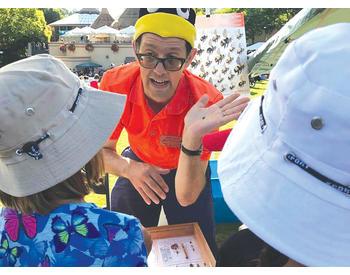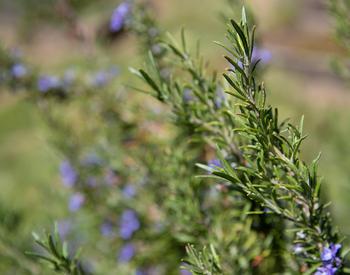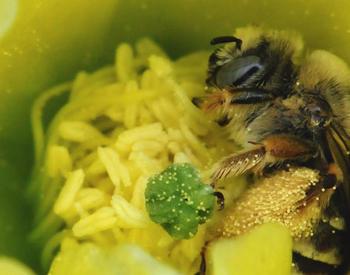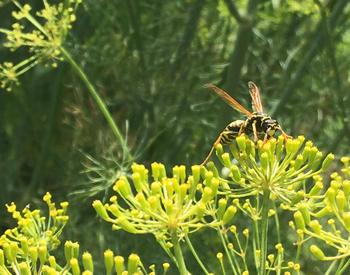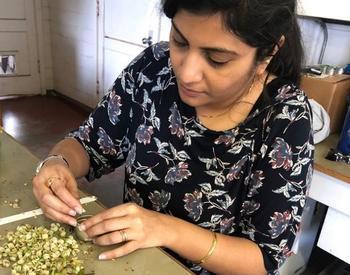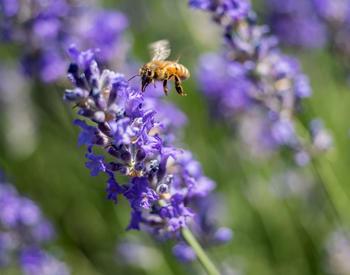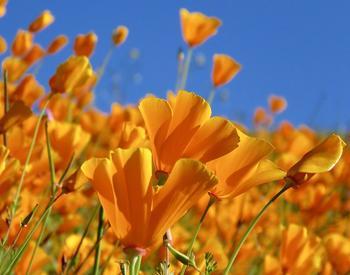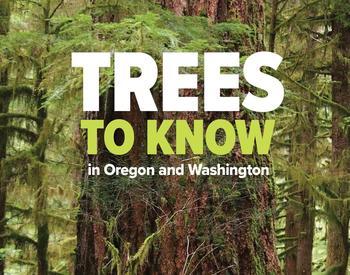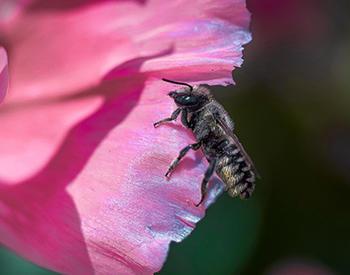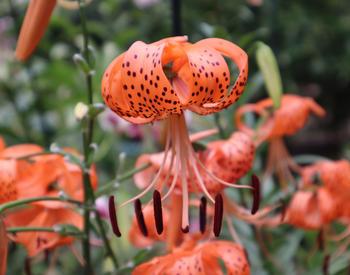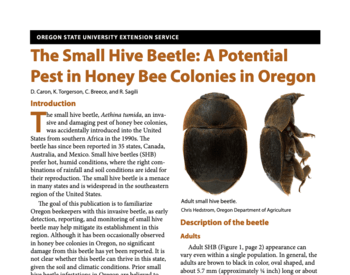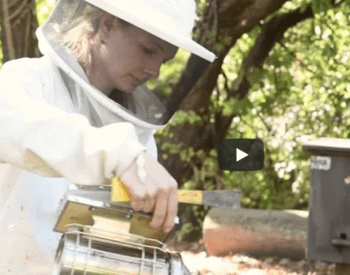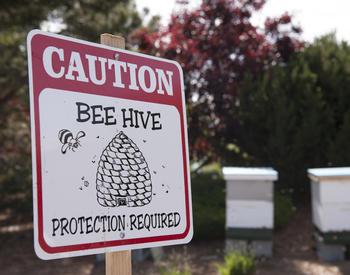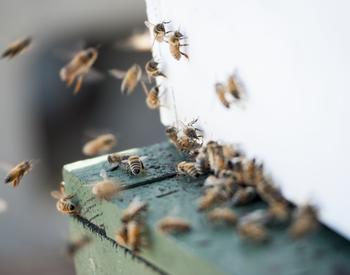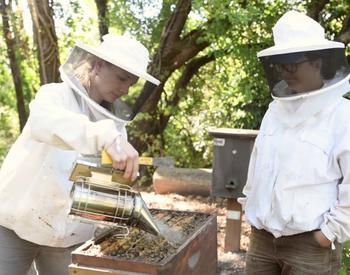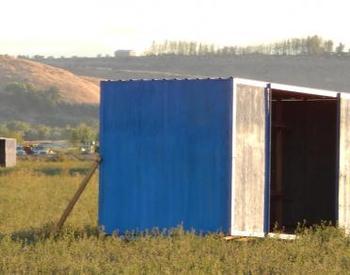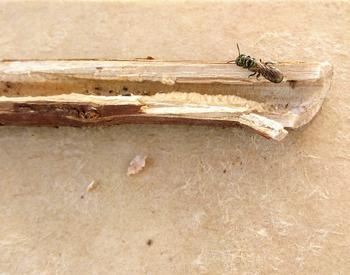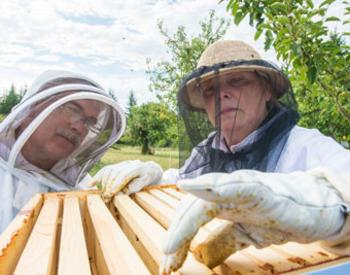Transcript
Transcription done by: Hailey Wallace
Andony Melathopoulos: [00:00:00] When you think about beekeeping supply businesses, you often think about companies that have been, really in operations since the civil war, things like Dadant, the Kelley company. These companies have been around for a very long time, but we've seen this resurgence in beekeeping over the last few years, and this has opened the space for some brand-new companies to emerge. I wanted to do an episode that sort of focuses on this phenomena, and I can think of no one better to talk to than Mandy Shaw up in Portland. Now, many of you probably know Mandy. She has a very slick and wonderful podcast called Beekeeper Confidential, but she also runs a company called Waggle Works, which produces these wonderful, delightful, handmade beekeeper veils. But, also provides mentorship to new beekeepers in the Portland area, face to face - having somebody come by and sort of walk you through the steps.
I wanted to talk to Mandy about starting up these new businesses, what she expects is going to happen now with Covid-19. But I also wanted to talk to her about swarming. She's a terrific swarm catcher and she's had a kind of crazy year this year with swarms coming to her place. So we're going to get to catch up on that. It's a great episode, Mandy is just a great person to interview and talk to. I'm really excited to bring the show to you!
Andony Melathopoulos: [00:00:00] Hi Mandy, how are you doing?
Mandy Shaw: [00:00:04] Hi, I'm great, it's good to see you.
Andony Melathopoulos: [00:00:07] Good to see you as well. You know, I first met you at the Portland Urban Beekeepers and I didn't realize at the time that you were fairly new to beekeeping. I didn't know this because you were kind of running the show.
Mandy Shaw: [00:00:19] Funny how that all happened. When I first became interested in bees, I started stalking Portland Urban Beekeepers on their Facebook page. I was one of the people that joined and then just quietly observed conversations between beekeepers. But, when I finally got my first hives, I went to their bee school and I joined their club, and then I heard that they were looking for a treasurer for their board of directors - and I have a background in finance, and so I thought, "well, this is great!" I can use the skill that I have to join up with this new skill that I'm trying to cultivate.
And Portland Urban Beekeepers has been such a huge facet of my beekeeping foundation, because it not only gave me a place to go to learn about bees, but it also gave me access to the community of members that are a part of the club. But also, access to, you know, the OSU bee lab, the speakers that we have to come and speak at the club. And it just has really accelerated my learning and what I ever would have made from working with bees.
Andony Melathopoulos: [00:01:32] You know, I was listening to one of your podcasts - and we'll talk about your podcast a little bit later on. But, I was listening to one of your podcasts you were sort of mentioning that in terms of people stepping up to the executive of their bee club and how that does allow you to accelerate your kind of initiation into beekeeping.
Mandy Shaw: [00:01:48] Absolutely. I think that because you sort of take on this professional role, even though it's a volunteer position, you have extra ownership and what you're doing with your local bee community. And people approach you a little bit differently, they look at you differently. And so, for me, I felt like I really had to take my personal beekeeping to a different level rather than if I had just been like, beekeeping in my backyard and not interacting with other beekeepers. Does that make sense?
Andony Melathopoulos: [00:02:23] It absolutely does, and I was the president of this, BC Beekeepers Association. Anyways, it's funny, it was like in the lull between the big high point of the seventies and when things got going and sort of like, it was kind of dying. And I remember, I learned a lot by being on the executive and just having to organize things. But, I also remember it was a difficult time as well because it was a time when you couldn't find new people. And you know, you come in and you're in your twenties, you're just mobbed - it's like, "oh the future!"
Mandy Shaw: [00:03:10] Yeah.
Andony Melathopoulos: [00:03:13] But you came in at a different time. You entered into beekeeping at a time of an upswing, there was a lot of interest in beekeeping. And you got involved with starting your own business. And I think about this because it seems like, throughout the history of beekeeping, suppliers and small businesses have been, you know, key to sort of like propagating beekeeping. I guess, I want to just ask you, why do you think things got going? How do you explain this sort of rise in beekeeping that's taken place recently? And the wave you sort of came in on?
Mandy Shaw: [00:03:53] I really think that because information now is so easily accessible because we've got YouTube, we have podcasts, we have Facebook -obviously I think has been a big driver of people sharing articles about the bees dying, and I think that people just want to help. But, what I noticed right away, and I am guilty of this as well, I got into beekeeping thinking that I was going to be really saving the bees. Without an understanding of how complex the whole issue is, and it's not just honey bees, and it's not just a matter of setting up a hive in your backyard. And so for the people that are getting into it without having an understanding of all of that, they're suddenly slapped with, you know - here's Varroa, here's EFB, you have to keep your bees from swarming if you live in a neighborhood.
There's just like all these issues that come along with managing backyard colonies that beekeepers aren't quite prepared for when they first get into it, unless they've done a lot of pre-research. But, bees and equipment are so accessible that you could sort of get all of that without having to look into it too much beforehand.
Andony Melathopoulos: [00:05:12] Yeah. Well, and it strikes me that those kinds of complications have given rise to these new services and new businesses. The kind of businesses that have emerged like yours are really novel - they're not the same. It used to be the Bee Supply Store, that was it. The Bee Supply Store, you'd go in to this little store, it made some of the business off selling candles. But it was this one place you'd go, but there weren't, all these other services available.
Mandy Shaw: [00:05:46] One of the things that I observed with, you know, PUB - is we had members who had even been keeping bees for a couple of years, but they still weren't comfortable doing a basic hive inspection. And so, I started going out and helping people with their hives, just for free. And I felt comfortable showing and talking about this stuff and I could see just having somebody there showing you, "yes, you're doing this right", "yes, you can hold the frame like this", and "you're less likely to smash a bee or something". Having somebody there to walk you through the steps is very different than going to a meeting and watching a presentation on it, or watching a YouTube video on it.
Andony Melathopoulos: [00:06:32] Isn't that the truth!
Mandy Shaw: [00:06:32] It's sort of like somebody there to just coach you through it. Help sort of stabilize your anxieties, maybe give some reassurance. And that's something that I've been able to offer a lot of my clients is just, I want them to feel comfortable enough in their own beekeeping so that they don't have to have somebody come out and, show them what to do. I want them to feel comfortable enough to be able to take off on their own and continue on with their beekeeping journey.
Andony Melathopoulos: [00:07:04] And so that's where Waggle Works came out of. It was seeing there was a lot of people who needed a personal kind of connection to their beekeeping. We will talk about the podcast in a minute, but I think the podcast is the same way. It's from the perspective of kind of peer connection, like, you know, supporting people through stories. Tell us a little bit about Waggle Works. Tell us how you sort of like, were able to meet this demand.
Mandy Shaw: [00:07:32] Well, I knew that if I was going to go into a beekeeping business, I did not want to rely on honey sales to be my anchor, you know, source of revenue. I'm not even in it for the honey. I get a honey harvest once in a while, but I don't sell it and it's not really my motivation. But, I also knew I couldn't just rely on helping people with their hives. I needed to come up with some other aspects that I could offer people. And I am an artist, I've always been a creator, I've always been a maker. And so before I even got bees, I started making these ridiculous bee bonnets. Like really outlandish bonnets with veils, and I used really high end materials and silks and stuff they're really impractical and - the designs have changed over the years. The reason that I started doing those is because, there's not a lot of really feminine beekeeper attire out there.
Andony Melathopoulos: [00:08:43] Oh, for sure.
Mandy Shaw: [00:08:44] And, I feel like when you're getting dressed to work with your bees, it's sort of like you're dressing for this sacred ritual. You know, this really special thing that you're going to do. You're putting on your Sunday's best to go and be with your bees. And so I wanted to feel pretty and wear something that I made for my beekeeping. And so over the years, I've modified the designs and I've gotten really excellent feedback from people on how to make them better. And now, selling the beekeeper veils is my biggest source of revenue for my business.
Andony Melathopoulos: [00:09:21] They're really unique, they're really amazing. Describe them a little bit - I think bee bonnet is a good description, but what's on the top? And, tell us about the fabrics.
Mandy Shaw: [00:09:34] So, I use hats that offer UPF sun protection. So, that's really important because, you know, as beekeepers, we do spend a good amount of time outside in the summertime. But also, the screen is far enough away from your face - so if you look back, you know, if you wore a fencing veil or something, that veil hits you in the face.
Andony Melathopoulos: [00:09:58] Sure does!
Mandy Shaw: [00:09:59] That's a vulnerability point if you're working with spicy bees, but it's also something that you can throw on over your street clothes if you have to go out to the apiary for something quick. Or, you can wear it with a bee suit. But, what I've heard from women that buy them is, they love it and they feel comfortable in them. And they just like how feminine and pretty, it makes them feel.
Andony Melathopoulos: [00:10:24] Tell us about the fabrics as well. You've got a couple of fabrics that you use for the part that would be the covering.
Mandy Shaw: [00:10:32] I really like linen because it's a natural material and it's breathable. So that's one that I use a lot. And then I also do like different cottons and of course now, with the whole Covid-19 thing happening, I've been getting a lot of requests for face masks - so I'm making those as well. It's funny because I will buy a bunch of materials and think, "okay, this is going to last a while", but then I'll put them up on my website and I'll make some kind of announcement on Instagram or something and I'll sell out, you know, right away. So, I'm learning how to better anticipate making my purchases for material so that it can last a little bit longer.
Andony Melathopoulos: [00:11:21] Well, I can imagine that as well. It's hard to know what the demand is. You have an idea and I think it's a brilliant idea and I think all the elements of your business are about personalizing. There is a kind of way in which you pick up the beekeeping manual and it is kind of generic. And you know, there's no personality in it. I think there's a real desire - I've always thought this about bee clubs, for example, that they are an educational thing, but one can't discount the sort of social kind of connection with people that you get through bee club. There's not many opportunities in the world anymore where you can get together with different people.
Mandy Shaw: [00:12:01] It's so true. I was never part of anything before beekeeping that gave me this type of community and this type of passion and connection and camaraderie. Even though there's some bickering, I think in general, we all want the same thing and that's having healthy bees.
Andony Melathopoulos: [00:12:22] Okay, so tell us a little bit about anticipating the demand and kind of getting that all worked out. Cause I imagine that it must've been shocking to you to buy a bolt of fabric that is going to last me a while - and it's like, "man, I have nothing left."
Mandy Shaw: [00:12:33] I know! So for the first couple of years I would get maybe two or three vail orders per season. And I was always surprised when I would get one and then, it just started to steadily increase. And now I'm getting like seven or eight orders a week.
Andony Melathopoulos: [00:12:53] Holy smokes.
Mandy Shaw: [00:12:54] So it's grown slowly, but it's grown at a pace, that I can handle. And now I don't have a heart attack when I get an order - I just get a smile.
Andony Melathopoulos: [00:13:12] You mentioned earlier, it's not just the veil sales, but you're also helping people kind of coaching them and looking after their bees. Tell us a little bit about that part of the business.
Mandy Shaw: [00:13:25] Yeah, I offer a couple of different services. One of them I call hands-on hive help, and that's for beekeepers who are proficient in doing the basics, but maybe there's something they need to troubleshoot or they just need a refresher on how to do hive inspections or, just to confirm what they're seeing is really what they think they're seeing. Or, making splits, you know, things like that. They might have me out like once or twice a year. And a lot of people will have me out to do the mite sampling for them, cause mite sampling, let's be honest, it makes people squeamish. They don't want to kill 300 bees to do an alcohol wash. They don't want to shake up the bees in a jar of powdered sugar, "that's cruel".
Andony Melathopoulos: [00:14:10] Give Mandy a call.
Mandy Shaw: [00:14:12] "Mandy will do it!" So, that has been one thing especially in the fall that I do a lot of. But, I also offer a year long mentorship program. For somebody who's like, really, they've never worked with bees before, but they want to do it. So I will source the hive, I'll source the bees, I'll get it set up for them, and then we meet every month to work on their hive.
Andony Melathopoulos: [00:14:40] Okay. Do you have people who just don't want to get into beekeeping that they'd like to have bees in their backyard?
Mandy Shaw: [00:14:46] There are, but none of them are my clients yet.
Andony Melathopoulos: [00:14:51] Okay, alright.
Mandy Shaw: [00:14:52] There's somebody that called me a week ago and I had spoken with them back in September or October and I gave them pricing information and they were kind of like, "ugh." But then they called last week and I'm sure it's because, you know, now they're home all the time because of the pandemic and they just are wanting to enjoy being outside and their yard - "Let's get some bees." So they called me and they were like, "we want to do it, we want to get bees now." Well, it's a little bit late to get going on something like that. And because of the pandemic, my kids are home all the time now. And, I've had to halt all of my in-person hive visits until this thing clears up. You know, schools are closed.
Andony Melathopoulos: [00:15:43] Right, because you have to look after your kids. This is a problem that a lot of people are having these days, is kids at home and just trying to work around your beekeeping with having to keep up with your parenting duties.
Mandy Shaw: [00:15:55] Yeah, absolutely. And now, like I'm a homeschool teacher now because they have online learning that they need to do and I have to help them with that. And so that takes a couple hours out of our day. And it's interesting because I've had a couple of people say, "well, why don't you just bring your kids with you?" I am a special needs parent. I have a son that's on the spectrum and it just doesn't work. It does not work to bring him along with me to do these visits - and I'm okay with that. And I feel like because I have done enough planning and I've created a business that is not just one offering.
There are other parts of my business that I can focus on right now and still have revenue coming in while this pandemic is taking place. I still have the podcast, I have my beekeeper vails, I can do my blogging. And if somebody really wanted to, we could do a video consult. I mean, the resources are there to do that. But, it was a decision that - I feel okay about it. But it was hard to tell my clients, "I'm sorry!" You know, I gave them some referrals so they could connect with some other really awesome beekeepers that are doing similar work that I'm doing. But yeah, it was kind of a bittersweet moment.
Andony Melathopoulos: [00:17:25] You know, I think about this, you know, in the history of beekeeping there are these periods that come that are very hard on businesses. I'm old enough to remember the eighties. Where everybody was dependent on honey prices and the prices just tanked. The US government had held surpluses and then they stopped the program, they dumped it on the market and there were people who had kind of diversified businesses who were able to ride it out. But, there were people that were highly leveraged, had taken out large loans on their business and were in real trouble when something kind of happens. And it sounds like maybe unintentionally by just focusing on bringing personality into beekeeping, you've been able to sort of like have a number of dimensions.
Mandy Shaw: [00:18:16] Yeah. It's, funny because before all of this happened, I was actually looking at having my veils manufactured on a larger scale still locally here in Portland, but, done at a sewing house. And I would have had to take a loan out to pay for all the materials up front, because of the volume. And I ended up deciding not to do that.
Andony Melathopoulos: [00:18:43] Wow.
Mandy Shaw: [00:18:44] And I'm very glad that I trusted my gut and said, "Yeah, I don't think we're quite there yet."
Andony Melathopoulos: [00:18:52] Wow. Well, thanks for talking about it. I think there's a lot of people probably listening to the show who are in some kind of similar situation, either around parenting or around a business that suddenly, the demand is shifted and it's really good to hear how people are dealing with this.
Mandy Shaw: [00:19:11] Yeah, yeah!
Andony Melathopoulos: [00:19:13] Well, let's take a quick break. I want to come back and I want to focus on your podcast, which I think is exemplary. It's great, Beekeeper Confidential. So let's take a quick break.
Okay, we are back! And we were talking at the break and one thing I've noticed, I follow you on social media and every time I look up, you've got another swarm! Tell us about that, this seems to be a good year for swarms?
Mandy Shaw: [00:19:40] It's just wild! Yes, this year is a really good year for swarms. I have always been kind of lucky in swarm catching. My very first experience with a honeybee swarm was before I even became a beekeeper. A swarm came and landed in my front yard and I was already interested in bees, but I wasn't quite ready yet. But that was the thing that, you know, made me realize I gotta do this thing. But we called the beekeeper from Portland Urban Beekeepers, Elliot Girlash, he actually recently passed away. But he was the first beekeeper that I ever met, he came and got the bees. But that was such an exciting day in my life. And, the following season when I got my bees, I put up a bait hive in the tree that those bees had swarmed to, and I caught two swarms back to back.
Andony Melathopoulos: [00:20:36] What! That is crazy!
Mandy Shaw: [00:20:37] And then every year I put up a bait hive in this tree and I don't know what it is about this spot, but swarms come every year. But this year something completely wild happened! And it was just this last week, the first really nice stretch of weather that we had here in April. I had scout bees at all of my empty hives and I knew because of the activity, something's going to happen - I'm going to get a swarm this week. I'm very blessed to have a neighbor that likes my bees and he doesn't mind the swarms and he doesn't mind the bee lights going over his backyard. He is always on lookout for when the swarms come. And so if he sees one and I'm not there, he'll text me or call me or walk through the swarm to knock on my door to say, "the bees are here."
Well, I've been inside and then I get a text message from him, "BEES!" So I run outside and there's a swarm coming into my backyard - not to my bait hive. This swarm chose a warre hive that was sitting on the ground storage.
Andony Melathopoulos: [00:21:50] Oh, isn't that something.
Mandy Shaw: [00:21:51] Like it's in a horrible location, but they moved in and as they were settling down, I look up and I see a second swarm coming in. And I was jumping up and down, "Yay, there's another swarm coming in!" This swarm was moving into the bee tree that I have. I have an empty bee tree and it's maybe six feet away from where the warre hive sits. Because the two happened one right after another, I mean, really within ten minutes of each other. Half of the second swarm went to the warre hive because they were fanning.
Andony Melathopoulos: [00:22:36] I've never heard of that!
Mandy Shaw: [00:22:38] And the other half went into the bee tree and I'm like, "oh my God, what do I do?" And there was so much confusion. And then I got a call that there was a swarm in Tigard. So, I had to leave to go get that swarm. But when I came back, I could see under the warre hive, there is a thick slab of bees. And it's the bees from the second swarm had gone under the bottom board of the warre hive, and were just kind of stuck there because they couldn't go in, there was so much fighting, there were dead bees like all over the ground.
So, I had to move the warre hive and I took the bottom board and I set it right in front of the entrance to the bee tree. And they knew they were home! They responded so quickly with fanning and running in, and that's so amazing to me, that they knew right away they were home and they were at the place that they had meant to go in the first place. But they missed the mark that first time because the swarms just happened too close to one another.
Andony Melathopoulos: [00:23:53] Wow! I could imagine that says something about the cues, that when you're in the air, things get a little crazy and it's like, "oh, these guys are in the air too." You just kind of follow them. That is a very interesting observation, I have to say. That is remarkable!
Mandy Shaw: [00:24:16] It was wild. Now let's add another layer of interest to this bee tree. Some bumblebees had moved into it.
Andony Melathopoulos: [00:24:26] What is it with your place like, Portland's a big place folks. Mandy's is not the only place to go - they don't know that. Okay, there was a bumblebee...
Mandy Shaw: [00:24:35] There's a bumblebee nest in the bee tree, and so there was this battle going on with this bumblebee nest and the swarm arriving. There are still bumblebees trying to go back in, but the honeybees aren't letting them.
Andony Melathopoulos: [00:24:54] That's the second thing that I've never heard of. But I can imagine happens all the time where you have a hole.
Mandy Shaw: [00:25:04] Yeah, yeah. But that was like certainly the most unusual swarm experience I've ever had, ever.
Andony Melathopoulos: [00:25:16] Wow. Well, there's so much about what you've just said in the last few minutes that is remarkable. There's that story, the fact that swarms seem to come to your house. Tell us a trick about baiting swarms, what do you do?
Mandy Shaw: [00:25:32] I've tried lots of different methods, and the bees always do something different than I expect. I will try bait hives that have fully drawn combs in them. I've tried bait hives with no combs. I've tried bait hives with one piece of brood comb or even taking brood comb and smashing it up and rubbing it on the insides of the walls and then sprinkling it around on the floor because they're looking for the scent really.
Andony Melathopoulos: [00:26:04] Yeah.
Mandy Shaw: [00:26:05] Lemongrass oil, I think works just as well as Swarm Commander. I've tried them both.
Andony Melathopoulos: [00:26:11] Swarm Commander?
Mandy Shaw: [00:26:12] Yeah, Swarm Commander has a synthetic Nasanov pheromone ingredient. And it's weird because when I first spray it on a bait hive, it does get bees attention. But they kind of seem like they're getting jumped out on it. And then, I think it wears off really fast and then they go. But I think that lemon grass oil, like save your money - you know, lemon grass oil works just as well.
Andony Melathopoulos: [00:26:41] Yeah.
Mandy Shaw: [00:26:42] But I've tried all different cavity sizes. I haven't really found that they always go after one thing over another. I think it all really depends on the needs, what they're looking for and how desperate they are.
Andony Melathopoulos: [00:26:59] Yeah, I imagine so. I think back to all those studies that Tom Seeley did on that little Island, giving them. sixteen permutations, like "you've got two choices on this island, you're going there, or there." It's like going to the optometrist, "is this better or is that better?" "It looks the same to me."
Mandy Shaw: [00:27:19] Right, exactly. So this was the first time that I've had swarms move into empty hives and not my bait hive. So, that was weird. And then I had a stack of nucleus colonies just on the side of my house, and I had a swarm move into those, so...
Andony Melathopoulos: [00:27:44] Wow.
Mandy Shaw: [00:27:45] And it wasn't very far from where the bait hive in the tree was. So the bait hive in the tree it's 12 to 13 feet off the ground. It has a small one inch hole entrance. It's a good small size. Usually that works, but this year they've just chosen other spots.
Andony Melathopoulos: [00:28:07] That's remarkable. Fortunately I was just making nukes the other day and I noticed no swarm cells yet. But, I knew it was going to come if I didn't deal with them now, they were getting pretty jammed in there. And it was amazing because, you know, just two weeks ago, I thought I had to feed them.
Mandy Shaw: [00:28:27] I lost a colony just like three weeks ago to starvation. And when it's at a location away from home. I have some bees in West Linn at a farm, and this was my star colony. I was devastated when I got the news that it had died. And when I opened it up they had no food. It was just, you could see it had been wall-to-wall brood. A really wonderful queen, but it just shows how close they were. They were just living on the edge and we had those cold days where at froze and it rained and they couldn't get out and they starved.
Andony Melathopoulos: [00:29:16] But not now, that is for sure.
Mandy Shaw: [00:29:19] My other hives are building tons of wax and putting away nectar and it's like, "ugh, if they could only have just held on a little bit longer, or if the bad beekeepers sitting in the interview chair had just gone and fed them." I think that's one of the things that's so exciting about beekeeping is just you're constantly being challenged, and if you don't learn from these mistakes, you'll never get good at it.
Andony Melathopoulos: [00:29:47] That is for sure. I often think about that with beginners, trying to simplify as much as possible. Not to make it simple, but so that they can isolate their mistakes because otherwise you don't know what went wrong and then you just keep repeating things.
Mandy Shaw: [00:30:04] Yeah, yeah. And I'm lucky I have a lot of bees to work with and I've gotten to play with a lot of other people's bees. So, I think for a five year beekeeper, I gotten to experience a lot more than then a typical backyard beekeeper in that amount of time.
Andony Melathopoulos: [00:30:24] Well, you've also been in a lot of beehives. Transitioning on, we were going to talk about Beekeeper Confidential, and that has taken you into a lot of apiaries. Tell us why you started the show in the first place. What were you what were you trying to.
Mandy Shaw: [00:30:41] "What was I thinking?"
Andony Melathopoulos: [00:30:44] Exactly?
Mandy Shaw: [00:30:47] Well, it was the first year that I was in business as Waggle Works. And early on after I quit the silly day job that I had and started this company, I was on the Ologies podcast with Allie Ward. And I didn't realize it at the time, but her podcast is really popular and, she has this enormous following of people that just adore her. And when I was on that podcast I realized this is pretty fun - it took me back to when I was a kid and my sister and I had this little keyboard and a tape recorder and it had a microphone and we would make our own radio show. They were call-in and radio shows and we had all these characters and like totally silly stuff. But it brought me back to that.
This is really fun, but also it showed me that it's easy to reach a global audience, because of the technology that we have available. And so that happened and I started thinking about what it would be like to have my own podcast. But I held onto the idea for months before really going through with it, because I realized not only are you putting yourself out there, but it's a big commitment and it's something that I wanted to do well. And I think you were probably one of the first professional colleagues that I mentioned, you know wanting to make this podcast for, and you were totally supportive of it! I really worried about stepping on other people's toes.
Andony Melathopoulos: [00:32:26] Oh yeah.
Mandy Shaw: [00:32:27] So your support was really awesome. And then I started playing with names of what it could be. It was going to either be, it's a total secret you guys, you can't tell anyone.
Andony Melathopoulos: [00:32:39] This is just us.
Mandy Shaw: [00:32:40] It's confidential. It was either going to be Beekeeper Confidential or perspectives and beekeeping. And I'm like, "which is more fun? Beekeeper Confidential"! So that's what I went with.
Andony Melathopoulos: [00:32:55] I love it because it really does describe the show. You're really kind of getting the confidence of the person you're interviewing and all the episodes are, you know, it's about beekeeping and there's all sorts of beekeeping skills you're learning, but you're also learning about the person and how they got into it. It really helps. I always think this with somebody who is getting into beekeeping for the first time. It's daunting and it's nice to hear, "oh, I made those mistakes, I've done it, I did this for this reason, my motivations changed over time." Like all of those things are really reassuring to hear.
Mandy Shaw: [00:33:29] And I also feel like because people are learning along with me. I learned so much from my guests and I really wanted to make sure that I wasn't making Beekeeper Confidential, how to beekeep like Mandy - I never wanted that to be the core of it. The message is we're on this journey together. Let's learn together in a way that's fun and friendly and something that I hope people look forward to hearing every two weeks.
Andony Melathopoulos: [00:34:06] Well you've had some great memorable guests. It's hard to sort of pick guests. And it's like, "who's memorable?" It's like "geesh." But who are some of the, just off the top of your head, just pull us through some episodes cause you've had some really great ones and some of the people you have on the show are mentors of yours locally, but you've also reached out to some peculiar characters.
Mandy Shaw: [00:34:33] Yeah, well, probably one of my favorite episodes is with, Dr. Samuel Ramsey. And I super loved that episode because of how fun he was to interview. He also sings, if you're not familiar with him, he has an amazing voice. And I wanted him to sing on my show. And so I came up with this really ridiculous song about Varroa mites, and I'm like, "I'm just gonna put myself out there and I'm going to sing it and I want to see if he'll sing it with me" and he did! And it was, it was such a delightful moment. Like we'd been talking about kind of heavy stuff, but then we sing the song and we're laughing, and it was just a really speacial moment. There was that, and then, Peter Nelson, the director of The Pollinators film, I reached out to him and...
Andony Melathopoulos: [00:35:38] I'd watched the film, but I didn't hear the episode, tell us a little bit about that.
Mandy Shaw: [00:35:40] Oh, he was so nice and generous with his time. And he's interviewing me while he's on the road cause he's showing it at all these different places, but he took the time to chat with me about making the film and he was such a down to earth guy. It was just really easy to talk with him. And I, I loved it. It was one of those episodes that I went back and listened to two or three times after publishing it.
Andony Melathopoulos: [00:36:11] Tell us, how did he get interested in this topic? Does he have a bee background or, how did he get drawn to it?
Mandy Shaw: [00:36:20] He is a beekeeper. He's been keeping bees for quite a while, actually, just as a backyard beekeeper. But he has an interest in farming and agriculture and wanted to do this piece about what's happening with the agricultural industry and how bees are affected by it. And one of the things that was a big takeaway for me was, I have a very different perspective on commercial beekeeping now, than I did prior to watching the film.
What he taught me was that they're simply responding to all of these different pressures that are placed on them, that are placed on their bees. They don't want to be having to treat their colony so frequently. They don't want to put their colonies in orchards that maybe the neighboring orchard is using some kind of fungicide or pesticide on them. But that's, that's just the reality of what it is now.
Andony Melathopoulos: [00:37:28] You've also had some episodes with not commercial beekeepers, but new beekeepers, people who are younger coming in. And I've been amazed at some of those episodes that just the skill level, their capacity. We had an episode recently with somebody who's a queen breeder from Santa Cruz.
Mandy Shaw: [00:37:45] Yeah, Emily Bonder.
Andony Melathopoulos: [00:37:46] She was amazing.
Mandy Shaw: [00:37:47] Yeah, thank you, I really enjoyed visiting with her. One of the cool things that's happening now, because I've been doing the show for like a year and a half. Previous guests are connecting me with people that they think I should have on the show. And so I feel like we're weaving this wonderful tapestry of connectivity, we all love bees so much, but we're always doing things a little bit different from each other and there's just so much to learn. And, I don't want the show just to be from people that are, you know, experts in the field. I want to a wide range of guests because it makes it more relatable - I think.
Andony Melathopoulos: [00:38:33] You know, I often hear from people and it's always great to hear from people. But I also sometimes wonder how the podcast is helping people kind of do pollinator health or how it inspires them. Have you had any feedback or do you have some sense of what your audience, well, how the podcast is sort of serving in their beekeeping journey?
Mandy Shaw: [00:38:56] One of the things that I think is really cool is when somebody's been on the show, they get a bunch of emails from people or people contacting them on social media like, "hey, I heard you want to be Beekeeper Confidential, I found you now." And so the show is sort of taken on - I'm able to use it as a platform to highlight and uplift what somebody else is doing, and that feels really good to be able to use it as a way to highlight somebody else's work. But I think that my listeners are mostly hobbyists, I do have people that don't even have bees yet that listened to the show.
Sometimes they'll write me and be like, "can you please do a really basic show? So like, we know what you guys are talking about", and I will do one at some point. But yeah, I'll have people just say, "I love what you're doing, thank you." And hearing feedback like that is really nice. There's only been a couple of trolls along the way, so I feel like we're doing pretty good.
Andony Melathopoulos: [00:40:06] You and I have both had somebody who's had the same complaint.
Mandy Shaw: [00:40:10] Oh man!
Andony Melathopoulos: [00:40:13] So the person's probably listening right now and said, "damn right, that is true". It's the laughing, they just don't like us laughing.
Mandy Shaw: [00:40:21] Let's do it!
Andony Melathopoulos: [00:40:26] Right, there you go. They don't like laughing, what monsters. Anyways, we have a segment that we do on all the shows. I'm really curious your answers. Let's take a quick break and we'll come back and get your book recommendations and tools and pollinator.
Okay, we're back. So three questions, as a podcaster I'm really curious cause you've really seen the world. So when I asked you, I ask you what is your book recommendation? I'm so curious what you'll say.
Mandy Shaw: [00:41:03] Well, I have a bookshelf that's loaded with amazing books and I've met some of the authors, but when I thought about what is my favorite book recommendation. I almost chose The Bees in Your Backyard, because that book has been an amazing resource for me, especially early on when I was curious about all of the bees that I was seeing in my pollinator garden. But, I also love a really wonderful story, and so I have to go with the Honey Bus by Meredith May.
Andony Melathopoulos: [00:41:34] That's a brand new one to me. Describe the book, what is it about?
Mandy Shaw: [00:41:38] It's so wonderful. Well, it is based on true events. It's her memoir, and she talks about growing up in Big Sur California where her grandfather was a beekeeper and she grows up around him working with these bees while also dealing with trauma from her relationship with her mom, that was very broken and how spending that time with her grandfather and the bees brought her healing.
Andony Melathopoulos: [00:42:13] Oh, really.
Mandy Shaw: [00:42:14] And her grandfather harvested honey out of an old school bus, or no, it was a army bus, I think it was that he converted into like a little honey extractor shed and that's the "Honey Bus." But she does such a wonderful job at describing every detail and I feel like beekeepers can really appreciate her book the most, because we know the smells, we know the sounds, we know that the feelings that come along with spending time with our bees, whether we were just sitting next to a hive or doing an inspection or catching a swarm. She touches on all of those things, and it's just a really lovely story.
Andony Melathopoulos: [00:42:57] So one more time, it's called?
Mandy Shaw: [00:42:59] It's the Honey Bus and it's by Meredith May.
Andony Melathopoulos: [00:43:03] Okay, great. I was thinking, there's a famous conceptual artist from postwar Germany. What's his name? He did all the bee stuff. And he had a bus that he filled with bees, it was some kind of like democracy thing like...
Mandy Shaw: [00:43:20] Oh my gosh,
Andony Melathopoulos: [00:43:21] What's the guy's name? Anyway, one day I'll remember. But, this sounds like a great story and I always love it when you have an author who really can recreate what we experience, but you see it on the page, you read it and it's just like, "oh, that's the word for it."
Mandy Shaw: [00:43:39] Yeah, yeah.
Andony Melathopoulos: [00:43:41] Okay. Our next question is, do you have a go to tool?
Mandy Shaw: [00:43:47] Well, when it comes to doing hive work, I'm a J hook.
Andony Melathopoulos: [00:43:53] A J hook? Oh, yeah.
Mandy Shaw: [00:43:57] Yeah, the hive tool. That's my favorite like beekeeping tool. But I also love my swarm catching bucket.
Andony Melathopoulos: [00:44:05] Oh, describe it!
Mandy Shaw: [00:44:06] So it's a five gallon bucket and you know, they make bucket lids that are also seats, so they're a little bit thicker. And you can buy them on Amazon. And I used that for the lid, but I use it to catch swarms and it has a little hole drilled in it for their entrance. And then it has a larger hole where I put a screen so they have ventilation. And when I go out swarm catching, I don't always know what hive I want to put these bees in or what apiary I want to put them in. So, having the bee bucket gives me options. It gives me something to safely collect them in that's lightweight and it's just the right size for them.
Sometimes they have to spend the night in it. Depending on the time of day that I caught the swarm. But when I find the hive that I'm going to put them in, it's very easy just to pour them into it from my bucket.
Andony Melathopoulos: [00:45:03] I know. I'm seeing it now. I have a picture of it in front of me. Oh, there it is. Okay. And they just crawl into that little hole and away you go.
Mandy Shaw: [00:45:13] Yeah, yeah. And because it's had so many swarms in it over the years, it's smells like a really wonderful, you know, bee swarm. And so it's, not hard to convince the bees to go into it. It doesn't take much.
Andony Melathopoulos: [00:45:27] It's also an OSU Beaver orange, which I also appreciate, thank you. Okay, last question I have is, do you have a favorite pollinator?
Mandy Shaw: [00:45:40] Well I do, and it's the worker honeybee.
Andony Melathopoulos: [00:45:45] Okay.
Mandy Shaw: [00:45:46] I really identify with the worker bee because she's kind of a jack of all trades. She's a builder, she's a forger, she's a protector, she's a caregiver, she's resourceful. And those are all qualities that I want to embody in myself.
Andony Melathopoulos: [00:46:11] I think that's a really good point. They do, do a lot of things. Throughout a bees life they will not be doing the same thing twice and they...
Mandy Shaw: [00:46:23] You have to be versatile to get by in this world.
Andony Melathopoulos: [00:46:27] And they are engaged in a quite a big venture. If you think about it. Like they don't think small. Neither do you!
Mandy Shaw: [00:46:33] They don't! And they all have to work together.
Andony Melathopoulos: [00:46:36] That's true.
Mandy Shaw: [00:46:37] It's never about just the one bee. You know, she's, not thinking for herself. She's thinking for her colony, for her family, what's gonna be best for them. That's mother in me talking.
Andony Melathopoulos: [00:46:51] Well, that is fantastic and it's been a real delight catching up with you. It has been long overdue and I wish you all the best especially in these difficult times.
Mandy Shaw: [00:47:00] Thank you.
Andony Melathopoulos: [00:47:01] You certainly are blazing the trail here in terms of bee entrepreneurship here in the Pacific Northwest. So thanks for joining us.
Mandy Shaw: [00:47:10] Thanks for having me.
The intense interest in beekeeping has created a new wave of beekeeping businesses. In this episode we hear about how these businesses are meeting the needs of a new generation of beekeepers.
Mandy Shaw is beekeeper and founder of Waggle Works in Portland, Oregon. She specializes in helping new beekeepers gain a better understanding of the complexities of life inside and outside of the hive, and become more confident in their bee handling abilities. Mandy is an avid swarm catcher and travels throughout the Portland Metro Area rescuing and relocating honey bees and bumble bees. In 2018 she started her podcast, Beekeeper Confidential. Mandy serves the beekeeping community as a board member of Portland Urban Beekeepers.
You can Subscribe and Listen to PolliNation on Apple Podcasts.
And be sure to leave us a Rating and Review!
Links Mentioned:
Mandy Shaw’'s Book Recommendations:
- May, Meredith. (2019). The honey bus: a memoir of loss, courage and a girl saved by bees. Toronto, Ontario: Park Row. Books.
Mandy Shaw’'s Go-To-Tools:
Mandy Shaw's Favorite Pollinator:
